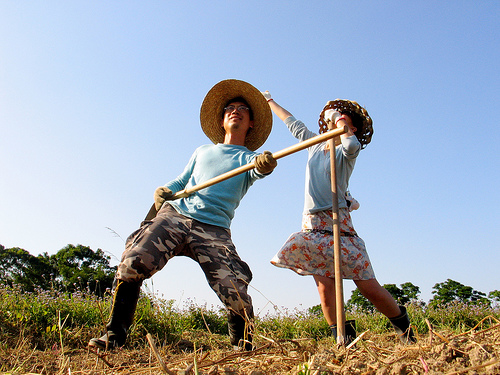Agricultural issues are getting more and more attention recently in Taiwan, sadly not because of the vibrant development of the agricultural sector, but quite the opposite.
In March, I reported about the debate on Statue of Rural Renewal that was about to be passed in Legislative Yuan. Given all the problems and controversies in the Statue, the Council of Agriculture had been pressured by a coalition of farmers, scholars, and social activists to organize more public hearings, in particular in rural areas for collecting more public opinions. However, these public hearings have been neglected by mainstream media, and the only way the public get to know the discussion and debate is via citizen journalists who have participated in the hearing and posted their reports at online platforms, such as dfun.com (zh) :
Citizen reports on public hearings
On April 21st, Kaohsiung County, citizen journalist Relax reported:
美濃林英清先生也表é”å…¬è½æœƒä¸¦æ²’有é”到政府資訊真æ£å…¬é–‹ï¼Œä»–是自己上網下載æ¢ä¾‹çœ‹äº†äº”é,èªç‚ºæ¢ä¾‹ä¸æœ‰è¨±å¤šå•é¡Œï¼Œä½†æ˜¯ä¹Ÿç„¡æ³•åœ¨å…¬è½æœƒä¸è¡¨é”æ„見。…
最後,æŽåˆ†å±€é•·ä¼¼ä¹Žæ²’有è½åˆ°é€™äº›è³ªç–‘çš„è²éŸ³ï¼Œèªªå‡ºã€Œä»Šå¤©æ°‘眾全都是支æŒè¾²å†æ¢ä¾‹ã€çš„çµè«–準備總çµé«˜é›„å ´å…¬è½æœƒï¼Œä½†å°ä¸‹é¦¬ä¸Šæœ‰æ°‘眾回應「哪裡有ï¼ã€
The next day, in Hualien County, peggy reported:
開放發言的時間到了,看著ç¾å ´è¨±å¤šè½ä¸æ‡‚國語ã€ä¸æœƒå¯«å—çš„è€äººå®¶ï¼Œæˆ‘擔心ä¸æœƒå¯«ç™¼è¨€æ¢çš„他們,是å¦æœƒæœ‰ç™¼è¨€æ¬Šï¼Ÿ
果然,上å°ç™¼è¨€çš„幾乎全都是立委ã€è°å“¡ã€ç¤¾å€ç™¼å±•å”會總幹事ã€æ‘長。…
As expected, only legislators, councilors, chief managers of community development associations, and village heads got on the stage to speak….
è½å®Œä¸€å ´ä¸è«‡è¾²æ‘å†ç”Ÿç™¼å±•æ¢ä¾‹å…§æ–‡ï¼Œä¹Ÿæ²’有任何政府與民間å°è©±èˆ‡å›žæ‡‰çš„å…¬è½æœƒï¼Œæˆ‘跟阿公ã€é˜¿å¬¤ä¸€æ¨£ï¼Œåœ¨é›¢é–‹æ™‚é ˜äº†ä¾¿ç•¶ã€‚
The bureaucratic and formalistic public hearings were under serious criticism online and finally President Ma Ying-jeou agreed to meet the anti-Statute activists in the Presidential Palace(zh) on April 29th. During the meeting, Ma required Chen Wu-siung (陳æ¦é›„) the Chief Councilor of the Council of Agriculture to review the whole Statute and post the revised Statute online “if necessary”. However, nothing had really changed after the meeting and the majority of Legislative Yuan are determined to pass the Statute before May 20th, a day marked the inauguration anniversary of Ma’s presidency. Activists then initiated a “citizen public hearing” via webcast. They call this activity “3 small media Webcasting“:
LiveCast
苦勞網ã€å°ç£ç’°å¢ƒè³‡è¨Šå”會是就是二å°åª’體,但三å°åª’體還有一å°å°±æ˜¯ã€Œä½ ã€ã€‚
第一次跨媒體åˆä½œå°‡æœƒåœ¨5月26日上åˆä¹é»žåŠï¼Œå°åŒ—立法院ç¾å ´é€²è¡Œç¶²è·¯ç›´æ’,三å°åª’體也邀請公民記者ã€éƒ¨è½å®¢ã€åœ°æ–¹çµ„織者ã€ç¤¾å€ç‡Ÿé€ 團隊一åŒåƒèˆ‡ã€Œå°åŒ—ç¾å ´å ±å°Žã€æˆ–åƒèˆ‡ã€Œåœ°æ–¹ç«¯é»žç›´æ’ã€ã€‚
希望將辯論ç¾å ´ç•«é¢å‚³é€åˆ°è¾²æ‘與社å€ï¼Œä½ å¯ä»¥å”åŠ©å ±å°Žåœ¨åœ°çš„è²éŸ³ã€å°‡è¨Žè«–è¾²å†çš„心得繼續投稿民間媒體。 è¾²å†çš„討論ä¸èƒ½åªåœ¨å®˜æ–¹è¾¦çš„å…¬è½æœƒä¸è‰çŽ‡çµæŸï¼Œåœ°æ–¹æ›´å¯ä»¥ä»¥ä¸»å‹•çš„æ–¹å¼ï¼Œè¦æ±‚官方來地方辦公è½æœƒï¼Œé€éŽç¶²è·¯ç›´æ’在一起檢視公共政ç–是å¦æœ‰å•é¡Œï¼Ÿæ¿€ç›ªèµ·çœŸæ£ 「由下而上ã€çš„討論,éžè®“「由下而上ã€æˆç‚ºæ”¿åºœå¸è²¬çš„å£è™Ÿã€‚
The first cross-media cooperation will be the live webcasting at 9:30 AM, May 26th, in the Legislative Yuan, Taipei. The three small Media will invite citizen journalists, bloggers, local organizers, community-building groups to participate in “Taipei LiveCast” or “Local end LiveCast”.
We wish to show the debate of the Taipei public hearing to other rural villages and communities. Apart from LiveCast, you can also help by covering local voices or submitting your view on the statue to other civil media. The discussion should not come to an end in those official public hearings. We expect the LiveCast to encourage local communities to be more active in demanding the government for local public hearings, and the LiveCast would allow people from across the country to discuss public policy together. We need to realize the genuine “bottom-up” discussion process rather than letting the government turning the “bottom-up” consultation into mere slogan and political performance.
Farmers-activists also use twitter , stickeraction, justin.tv, and other social media to spread the above message.
However, recently president Ma faced a new wave of political crisis after the mass rally and over night sit-in protest against his China policies on 17th of May. Public attention might be directed to more dramatic political controversy rather than “regular law enactment”, like the Statute of Rural Renewal.
Songs and musics
Meanwhile an indie band, Hao-Ke (好客樂團) took another approach to raise public awareness of Taiwan’s rural crisis. Members of the band are all farmers and they have recently entered the entrant list of the 20th Golden Melody Award on Best Bands. Indeed, the cultural approach is very effective.
Ecogoodies recommended Hao-Ke’s album “Love to Eat Rice”:
這是我喜愛的一張專輯”æ„›åƒé£¯”ï¼Œæ˜¯å¥½å®¢æ¨‚éšŠçš„ä¸»å”±é™³å† å®‡ï¼Œåœ¨2006年離開喧囂的城市,走進å°æ±æ± 上的有機稻田,開始耕田計畫…
跟許多人一樣,我早早就離開生長的家鄉,自æ¤åœ¨éƒ½å¸‚裡åœç•™ï¼Œå®¶é„‰çš„記憶也總是愈來愈é 。æ¯æ¬¡ï¼Œæ„Ÿè¦ºå—傷或是失望的時候,就會想起家鄉空氣和土地的味é“,讓我想è¦å›žåˆ°æœ€å…ˆå‡ºç™¼çš„地方,找到é‡æ–°ä¾†éŽçš„力é‡ã€‚
 Photo by Guan Yu, the vocal of Hao-Ke.
Photo by Guan Yu, the vocal of Hao-Ke.
Hao-Ke described their feeling after they were nominated in the Award on their official blog:
ç¾åœ¨æˆ‘待在田裡的時間更多了,æ¯å¤©å¿ƒç¹«è‘—田地裡的æ¤ç‰©ï¼Œè¦ºå¾—心é 充實。金曲çŽå而æˆäº†æƒ±äººçš„外務。我åšéŸ³æ¨‚的目的ä¸æ˜¯ç‚ºäº†é‡‘曲çŽï¼›ä½†ä»–的力é‡å»åˆé‚£éº¼å¼·ï¼Œè®“我ä¸å¾—ä¸æŠŠå®ƒæŽ›åœ¨å¿ƒä¸Šï¼Œå¿ƒæƒ…跟著它起起ä¼ä¼ …..
They started the experimental project of “rice coop” about 3 years ago. Ke Zhi-hao, the guitar player of Hao-Ke explained their idea and daily routine of the “rice cooperatives” on e-info.org:
我們在農田ä¸æ¼”出,下田æ’秧除è‰ï¼Œæ›¿ç¨»ç±³æ‹æ”ç´€éŒ„ç‰‡ï¼Œæ”¥å¯«æ–‡ç« ï¼Œæ”影,寫æŒï¼Œè£½ä½œå”±ç‰‡ï¼Œç”šè‡³å°‡æˆ‘們種的有機米,在å°åŒ—女巫店演出時實地煮給來看演出的觀眾們一起享用
我們相信å¥å…¨çš„å¸‚å ´æ©Ÿåˆ¶æ˜¯æ供較多的é¸æ“‡ï¼Œå¯ä»¥ä½¿æ•´å€‹å¸‚å ´æ›´å¼·éŸŒèˆ‡å¢žåŠ å½ˆæ€§ï¼Œç”Ÿç”¢è€…ä¸å†åªæœ‰è—‰ç”±ä»²ä»‹è€…來進行行銷,甚至å¯ä»¥é¸æ“‡ä¸€åŠé€éŽä»²ä»‹è€…,å¦ä¸€åŠè‡ªå·±ç›´è³¼
The band uses wikimapia to show the location of their farmland, and encourage audiences and fans to join the cooperation.
Apart from Hao-Ke, bands like Country Boys (zh) and Sheng Xiang also convey their love, sorrow, and anger for the disappearing Taiwanese agriculture through their music. These bands and musicians also actively participate in street gatherings or protests against destructive agricultural policies and globalization.
Artists and activists in Taiwan are cooperating more and more frequently on various social issues though their influence is still weak when compared with the government and big corporates. But joint handedly, they make the civil society more vibrant .
Last but not the least, please listen to “I Don’t Want to Be a Farmer Anymore”, a song full of anger depicting the erosion of Taiwanese agriculture and rural life, performed by Country Boys when they attended “Free Burma, Free Aung San Suu Kyi” concert last year.
This article was originally published on globalvoicesonline.org

Leave Your Comments